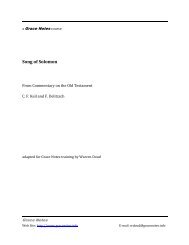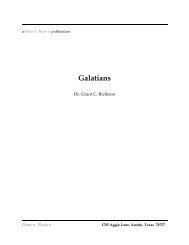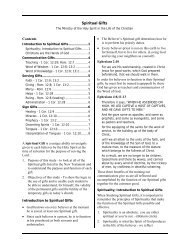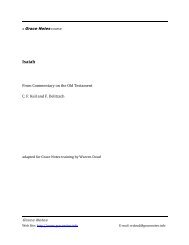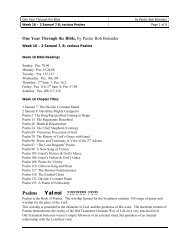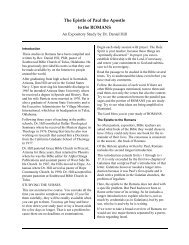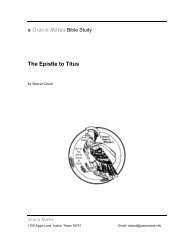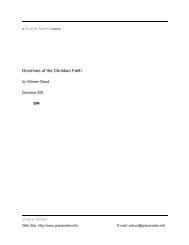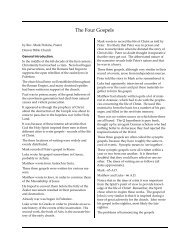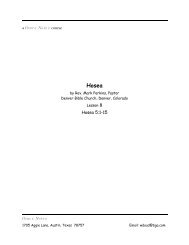Create successful ePaper yourself
Turn your PDF publications into a flip-book with our unique Google optimized e-Paper software.
<strong>Apostolic</strong> <strong>Fathers</strong> 10campaign against heresy is thus not waged in avacuum but always and inevitably within thecontext of his life (and death) situation.(3) <strong>The</strong> third concern of Ignatius has to do withchurch order and submission to the bishop’sauthority. His theology may be described assacramental in both a narrower and a broadersense. In the narrow sense it is clear that heputs great emphasis on the sacrament of theLord’s Supper. But in the broad sense histhought is sacramental in its insistence thatspiritual realities must find their embodimentin that which is visible and physical. Just asJesus was no phantom but actually “becameflesh” (cf. Jn. 1:14), so the Spirit must “becomeflesh” in different ways in order to have anyvalidity or authority. Flesh is not a worldly orevil principle opposed to the Spirit, as it issometimes in Paul, but rather as in John thenatural and appropriate sphere in which theSpirit must express Himself. This is clear inIgnatius’ theology of the eucharist, which buildsupon Jn. 6:52–58 with its demand to eat theflesh and drink the blood of the crucified andrisen Lord (see Ign Eph. 20:2; Smyrn 7:1). Butwhere John limited his insistence on “flesh” tothe sacrament and to the historical reality ofJesus Christ, Ignatius extends it also to thematter of church organization. In fact there canbe no valid eucharist unless the bishop (orsomeone he appoints) is present to celebrate it(Ign Smyrn 8:1f; cf. Magn 4:1). John’ssacramentalism is combined with virtualsilence about particular offices or ministries,but to Ignatius spiritual realities must find theirembodiment in the structure of the institutionalChurch. Ignatius is the first real advocate ofepiscopacy in the ancient Church — probablynot episcopacy in the modern sense of onebishop supervising a group of churches eachwith its individual pastor, but in an incipientform involving “one man rule” in each localcongregation. This is of course a form of“episcopacy” which is found today in the vastmajority of Christian denominations, eventhose which follow a “congregational” type ofchurch government, but it is not characteristicof the NT period.Ignatius undergirds his high view of episcopalauthority with theological arguments andelaborate imagery. At Ephesus the presbytery“is attuned to the bishop like the strings of aharp” so that “by your concord and harmoniouslove, Jesus Christ is sung” (Ign Eph. 4:1). Unityis essential to the Church, and for Ignatius thismeans unity with the bishop, even as theChurch is united with Jesus Christ and Jesuswith the Father (5:1). <strong>The</strong> bishop is sent fromthe Lord and is therefore to be regarded as if hewere the Lord himself (6:1; cf. Mt. 10:40).Sometimes the bishop represents Jesus Christ(e.g., Ign Trall 2:1); at other times the bishoprepresents the Father, while the deaconsrepresent Christ the servant, and thepresbytery the apostles (Ign Trall 3:1; cf. Magn6:1). While on the one hand he is the divinerepresentative, on the other he is theembodiment of the whole congregation,especially as it ministers to the needs ofIgnatius himself, the prisoner (e.g., Ign Eph. 1:3,Trall 1:1). <strong>The</strong> churches must recognize andsubmit to his authority and do nothing apartfrom him, just as Jesus did nothing apart fromthe Father (Ign Magn 7:1; Trall 2:2). Eventhough his function is not primarily that ofprophecy or teaching, his authority is beyondquestion (Ign Eph. 6:1; 15:1), for he is theadministrative leader of the church. <strong>The</strong>re canbe only one bishop even as there is only oneeucharist (Ign Philad 4:1). Nevertheless,Ignatius knows that the bishop is not absolutelyessential for a church. His own church atAntioch is of course without its bishop for atime. God is its shepherd in place of Ignatius,and Jesus Christ alone is its bishop (Ign Rom.9:1). For this reason, however, the otherchurches are to support Antioch with theirprayers. <strong>The</strong> one church in which nothing issaid of a bishop is the church of Rome, and it ispossible that the supreme authority there stilllies with the presbytery, as it did a short timeearlier according to the witness of 1 Clement.<strong>The</strong>re is every indication that these majortheological concerns of Ignatius are all tiedtogether in his mind. His martyrdom is a kind ofultimate expression or illustration of the realityof the eucharist; the eucharist depends for itsvalidity on the authority of the bishop; thesacrament and the episcopal office togetherbring about and guarantee the unity of theChurch so as to furnish the antidote to the



